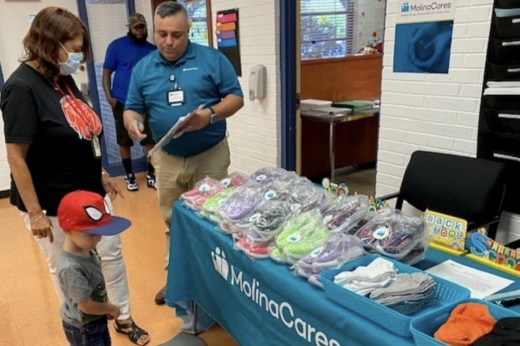Molina Healthcare of Texas, an Irving-based health care agency, said it is enhancing services in the San Antonio area, including in-home health care for at-risk individuals.
Molina Healthcare of Texas is also working with its MolinaCares Accord organization to further support a program aimed at securing meaningful, integrated community employment for people with intellectual and developmental disabilities.
According to a news release, Molina Healthcare of Texas is strengthening partnerships with community groups and emergency first responders by sponsoring mobile health programs in San Antonio, McKinney, Plano, Dallas, Fort Worth, Houston and El Paso to affect the most vulnerable individuals in these communities.
Molina officials said this program has helped to reduce nonemergency hospital visits and related costs for economically challenged patients.
Chris Coffey, Molina Healthcare of Texas plan president, said the mobile health programs, among other company initiatives, help patients to navigate a complex health care system that can seem intimidating at times.
Molina’s mobile health community partners include the Southwest Texas Regional Advisory Council, which serves the San Antonio area.
“Molina’s innovative mobile integrated health program allows us to serve members in the comfort of their home to provide nonemergency assessments, vaccinations and more. This benefit is especially valuable for individuals with mobility or transportation concerns,” Coffey said.
Chris Velasquez, program manager for the San Antonio Fire Department’s Mobile Integrated Healthcare program, said Molina’s mobile health program has had a positive effect on vulnerable local community members.
“Through our partnership with Molina, we’re able to reach even more patients in and around San Antonio and ensure that our community, especially historically underserved groups like elderly patients and low-income communities, have access to the care they need and feel empowered to make health decisions,” Velasquez said.
In a separate matter, Molina Healthcare of Texas said it is collaborating with the MolinaCares Accord nonprofit to award a $20,000 grant to Project SEARCH, which will help community partners in Bexar County to further develop a transition-to-work program for a cohort of young people with disabilities.
A news release said the new funding will support the expansion of the Project SEARCH model in Texas by implementing a program site in Bexar County and developing interorganizational partnerships for its long-term sustainability.
Coffey said workplace training and exposure to different careers and skills is an important part of any young person’s path.
“Project SEARCH empowers individuals, preparing them for competitive employment. Molina looks forward to this partnership as it expands to provide Texans with disabilities meaningful opportunities to earn a living and kickstart their careers,” Coffey said.
The release said Project SEARCH combines real-life work experience, employee training and independent0living skills with the goal of total workplace immersion and successful transitions to adult life for its participants.
Molina officials said interns spend nine months in intensive employment preparation, exploring career options and training in different workplace environments.
The program’s collaboration with schools, local agencies and employers allows for an internship model and job search process that ideally results in employment that matches individuals’ interests and newly acquired job skills, the release said.
“Project SEARCH is so excited to have this opportunity to expand our reach in the state of Texas. Each new program site means that more young people with intellectual and developmental disabilities will have the chance to experience the life-changing benefits that accompany meaningful employment,” Project SEARCH consultant Joy Burress said in the release.
The release said the Project SEARCH model is operating at 685 program sites in the U.S. and around the world, having served 35,000 young people with disabilities since 2010. An estimated 70% of program graduates achieve competitive, integrated employment, earning at least the minimum wage and working at least 16 hours per week, the release said.





